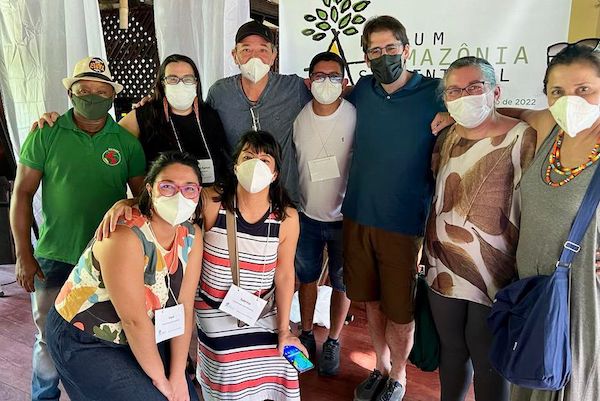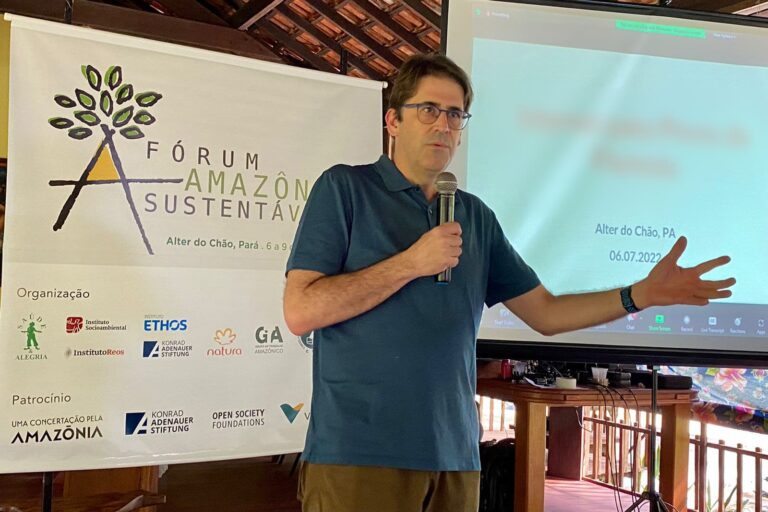Trazendo contribuições ao tema, estiveram presentes na reunião o coordenador geral da iniciativa Mapbiomas e idealizador do projeto que pretende levar internet aos povos da floresta, Tasso Azevedo; José Carlos Galiza, coordenador executivo da Coordenação Nacional de Articulação das Comunidades Negras Rurais Quilombolas (Conaq); Luiz Penha, assessor técnico da Coordenação das Organizações Indígenas da Amazônia Brasileira (Coiab); Dione Torquato, secretário geral do Conselho Nacional das Populações Extrativistas (CNS); Carla Ruaro, pianista, pesquisadora e produtora, idealizadora do espetáculo musical e audiovisual “Raízes, um piano na Amazônia“; e Luiz Pardal, músico multi-instrumentista, diretor musical, compositor e professor da Escola de Música da Universidade Federal do Pará (UFPA).
Lívia Pagotto, gerente de conhecimento do Instituto Arapyaú, abriu o evento relembrando os pilares da atuação da rede, que hoje soma mais de 500 lideranças de diversos setores.
Em seguida, Renata Piazzon, diretora do Programa de Mudanças Climáticas do Instituto Arapyaú e secretária-executiva da Concertação, aproveitou o espaço para também divulgar algumas novidades da iniciativa. Dentre elas, destacou o lançamento da nova seção do site da iniciativa, o Mapa das Plataformas, disponibilizado através das ferramentas de busca e seleção na página de Conhecimento. O mapeamento reúne 14 plataformas com dados sobre 12 diferentes temas na Amazônia Legal, servindo de subsídio para a formulação e implementação de projetos e políticas públicas. A intenção é que o universo de atores que atuam na região (governo, academia, terceiro setor, setor privado) se aproprie dessas ferramentas, a fim de alavancar a capacidade de planejamento e resposta aos desafios do território.
Renata destacou também as entregas recentes dos Grupos de Trabalho da Concertação. Dentre elas, a criação de uma facility para acelerar a regularização fundiária na região, a parceria com a embaixada brasileira em Berlim (Alemanha) para facilitar a captação de recursos e dar visibilidade aos negócios no campo da bioeconomia, a aprovação do projeto Itinerários Amazônicos junto ao Fundo Socioambiental do BNDES, o lançamento da Galeria de Arte e do Mapa das Artes e Artistas das Amazônias, e a construção do Projeto de Lei (PL) e do Projeto de Emenda à Constituição (PEC) de cancelamento de inscrições no Cadastro Ambiental Rural (CAR) em áreas de florestas públicas não destinadas.
Projeto para Conectividade na Amazônia
“Queremos implementar internet rápida, e mais, que chegue rapidamente a todas as comunidades”.
Tasso Azevedo
Para dar início ao debate e contribuições, foram apresentados os dados fornecidos pela plataforma Amazônia Legal em Dados, os quais indicam grande disparidade de acesso à internet na região, em relação ao restante do país. O primeiro a trazer sua contribuição foi Tasso Azevedo, apresentando aos presentes a iniciativa idealizada por ele e que pretende levar internet às comunidades tradicionais.
O engenheiro florestal trouxe mais detalhes do processo participativo de formulação do projeto, o qual contou com a presença, contribuições e direcionamentos das comunidades da floresta (aldeias indígenas, comunidades quilombolas e extrativistas).
Com o propósito de alcançar a totalidade dessas comunidades no prazo de três anos, o projeto prevê a implantação de pelo menos um ponto de conexão em cada uma dessas localidades.
“No quilombo, a gente precisa subir na copa do açaizeiro para acessar a internet”.
José Carlos Galiza
Na sequência, o coordenador da Conaq, José Carlos Galiza, chamou a atenção para a realidade dos povos quilombolas. Segundo ele, o projeto tem trazido muitas esperanças, uma vez que essas comunidades estão vivenciando “o ápice do racismo ambiental”, enfrentando conflitos de terra em razão da expansão do agronegócio, com dificuldades para acessar recursos e serviços públicos ou viabilizar a permanência de seus jovens nas universidades e escolas técnicas. “Sem internet”, disse Galiza, “temos dificuldade de pedir ajuda, buscar socorro”. “Esse projeto é de suma importância para a nossa sobrevivência”.
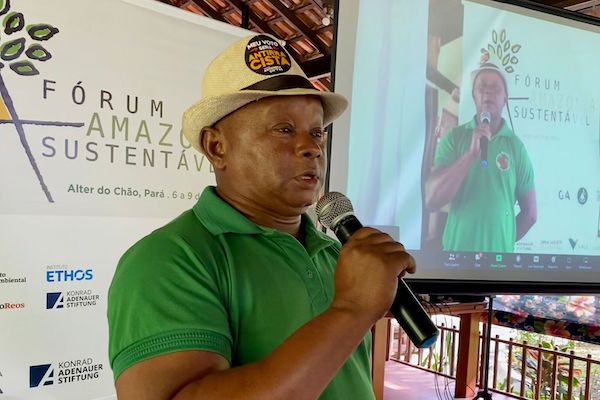
“O importante é que estamos construindo isso juntos. Este é um projeto de todo um conjunto de pessoas, não é de um ou de outro”.
Luiz Penha
Representando a Coiab, Luiz Penha destacou que o objetivo das comunidades indígenas no projeto é garantir o direito à acessibilidade. Com a tecnologia, torna-se viável o monitoramento e a vigilância dos territórios, a conexão entre as aldeias, o acesso à informação de qualidade, a serviços de telemedicina e de educação. “Para nós, vai ser um avanço”, afirmou.
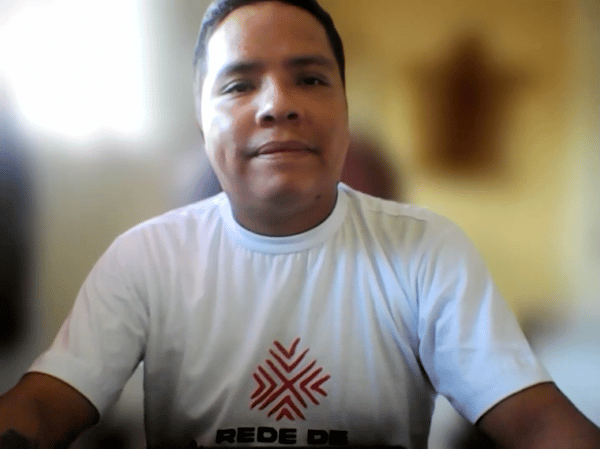
“O ativismo socioambiental, que não é uma aventura, é uma luta incansável, está dentro de cada um de nós”.
Dione Torquato
Já para Dione Torquato (CNS), é preciso considerar “a Amazônia que queremos e os desafios que temos”. Dentre os desafios, destacou a proteção e manutenção da floresta em pé, a garantia do modo de vida das populações tradicionais, a promoção do uso sustentável dos recursos naturais, a garantia do acesso e a inclusão digital.
Dione lembrou que a conectividade pode ser útil para ajudar no monitoramento de desmatamento e queimadas, viabilizar o monitoramento participativo da sociobiodiversidade e para os estudos sobre os efeitos das mudanças climáticas. Além disso, vai facilitar a organização socioprodutiva, a gestão e a governança territorial.
Segundo ele, a conectividade deve ser vista, antes de tudo, como um direito dos povos tradicionais, além de também ser considerada uma ferramenta de luta política.
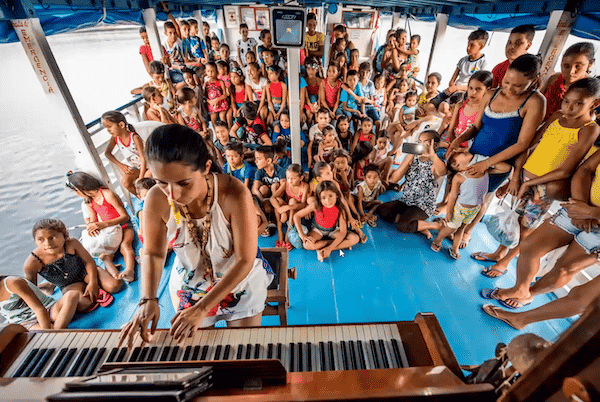
Em seguida, a palavra foi passada à pianista Carla Ruaro e ao compositor e professor de música, Luiz Pardal, que participaram de forma virtual.
“Eu trago o piano para a floresta e depois trago a floresta para o piano”.
Carla Ruaro
Carla interpretou duas lindas peças ao piano e contou sobre o projeto “Raízes: Um piano na Amazônia”, que consiste numa expedição de barco que leva o piano para comunidades ribeirinhas na Amazônia, mostrando um instrumento que lhes é desconhecido, assim como a música de compositores da região. Para ela, o projeto permite levar o piano para a floresta e depois trazer a floresta para o ambiente do piano, às salas de concerto e às plateias internacionais, cujo imaginário sobre a Amazônia muitas vezes ainda está restrito a um imenso tapete verde e que não percebe a presença das pessoas ali.
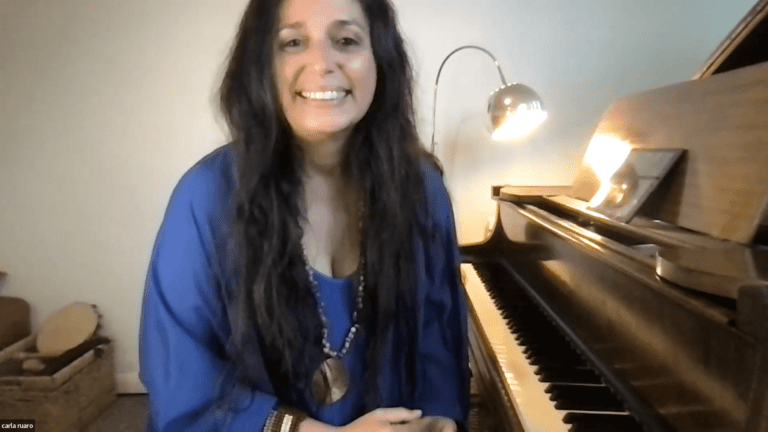
“O norte ainda é um mistério musical, artístico, de natureza, de tudo isso, para o restante do Brasil”.
Luiz Pardal
Por sua vez, Luiz Pardal falou do impacto da arte em sua própria vida e na vida dos povos da Amazônia, que possui grande potencial transformador, especialmente para as crianças. Ele sublinhou a diversidade cultural existente no interior da Amazônia, pois “não há como separar a nossa arte da nossa maneira ‘amazônica’ de viver”. O imaginário amazônico está muito ligado à arte e às peculiaridades da região. “A Amazônia é um país, o Pará é um país, a Ilha de Marajó é um país, cada pedaço da Amazônia é diverso e é desconhecido no restante do Brasil”, completou.
Luiz destacou a importância do projeto de conectividade para a Amazônia, não só para facilitar a vida das pessoas, mas para divulgar essa cultura para o mundo.
“Quando a gente priva uma comunidade do uso da internet, a gente a priva do direito à cidadania”.
Bruna Lima
Por último, Bruna Lima, do Comitê Chico Mendes e Instituto de Estudos Amazônicos, trouxe sua contribuição ao debate, reforçando a importância da conectividade para a manutenção de uma sociedade democrática. Para Bruna, “as florestas em pé são as florestas habitadas” e “a internet é uma ferramenta de exercício da cidadania”.

